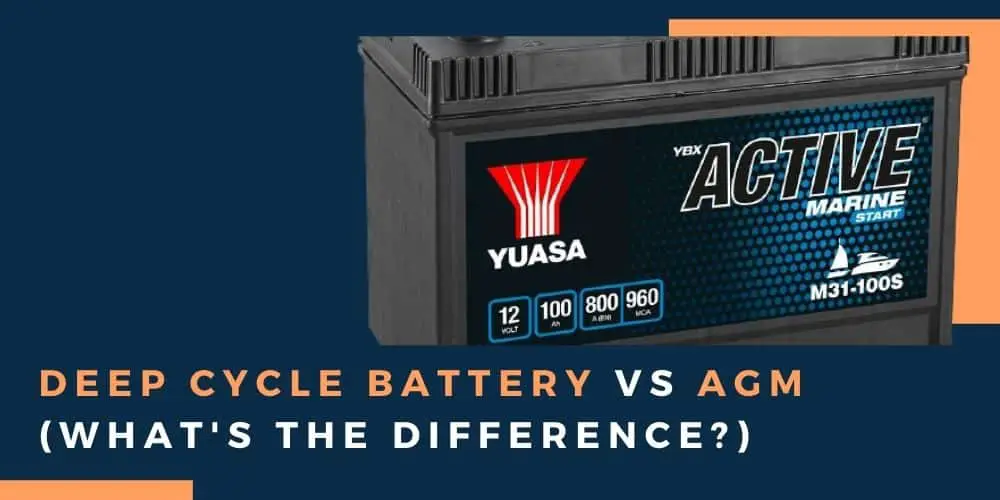Deep cycle batteries come in a few varieties and if you aren’t familiar with them then things can get a little confusing. Today we’re going to clear the fog a little by comparing the most popular deep cycle battery types so that you can get a better idea of their differences.
So, deep cycle battery Vs. AGM… What’s the difference?
If we compare 3 deep cycle battery types, those being Lead-acid, Gel and AGM , the main differences are in how the electrolytes are stored and in the performance, with Lead-acid scoring the lowest, Gel falling in the middle-range, and AGM considered to be the best.
We’ll give you a comparison of the superior Gel and AGM varieties and then tell you how they perform against the more common Lead-acid deep cycle battery.
After that, you’ll have a practical understanding of how these batteries do what they do so that you can select the right one for your needs.
Contents
The similarities sometimes lead to a bit of confusion
Our primary performers, the Gel and AGM deep cycle batteries often get confused for one another because they have a lot of traits in common. This doesn’t happen with the Lead-acid batteries, which have a liquid suspension that immediately gives them away. Gel and AGM, however, are both known for the following:
- Low self-discharge
- Safe in areas with low ventilation
- Can be mounted anywhere
- Do not require special transport when shipping
The primary differences in Gel and AGM deep cycle batteries
The areas where these two deep cycle batteries differ the most is in how they hold their electrolytes, with the Gel variety employing, of course, a Gel paste and the AGM batteries utilizing an absorbed glass mat medium to store the electrolytes.
So, what about performance?
Well, AGM and Gel both score high in performance, but if you are working with an alternator then AGM is a better option, because Gel batteries can be more sensitive to higher voltages.
AGM batteries also have an advantage over Gel batteries in that they cannot be spilled. This makes them safer than the Gel variety.
AGM batteries also perform substantially better than Gel in freezing conditions and they tend to cost less than a comparable Gel, making them a popular choice with many large companies.
Both Gel and AGM batteries may be quickly recharged and provide high bursts of power. With both of the batteries being very similar, you might wonder why anyone would bother with Gel deep cycle batteries.
While AGM batteries are used more often, Gel does have a few areas where it excels:
- Not spill proof, but highly spill-resistant
- Gel batteries run cooler than AGM batteries, making them better for high temperature environments
- Gel batteries always perform at peak voltage for their lifespan, though you do have to be more careful about the charging.
What about Lead-acid deep cycle batteries?
The most common deep cycle battery, Lead-acid deep cycle batteries have a water suspension of electrolytes and you do need to be careful to avoid spillage. That said, they are sturdy batteries and are working-away as you read this in golf carts, boats, and many other devices.
Let’s see how this most common deep cycle battery compares with the higher-end Gel and AGM:
- Charging – Recharging a Lead-acid battery is not done as quickly as it would be with AGM or Gel. It is much more time consuming, in fact, as you need to take a Hydrometer to check the electrolyte levels and if the charger that came with your battery doesn’t have a voltage regulator you have to check every hour to avoid overcharging it.
- Higher voltage performance – Like AGM, Lead-acid batteries perform well with higher voltages and are easier to use with an alternator than a Gel battery.
- Maintenance – Lead-acid batteries can degrade faster than a Gel or AGM and you need to check individual cells with your hydrometer occasionally so that you will know when your battery starts degrading.
- Cost – Initially Gel batteries cost about 4 times as much as a Lead-acid deep cycle battery, but these days you might find a low-end Gel for about 30% more. That said, if your battery will be working with an alternator you might want to go with the Lead-acid.
So which battery is the best?
Overall, AGM is considered the superior choice. They provide the deep cycle power that you need without the hassle of spillage worries, they are fine with high voltage requirements, and they carry a lower price tag.
If you need a battery for a much warmer working environment, then that would be one rare exception where you might go with a Gel deep cycle battery.
Finally, if the budget is really tight right now, a Lead-acid battery is often just fine but keep in mind that the money you are saving is going to come at the price of recharging time and handling this type of battery.
Just make sure to minimize that time hit by getting a charger with a voltage regulator so you can hook it up and leave it alone.
So, AGM, Gel, or Lead-acid… what’s it going to be? Now that you’ve got the facts you should have a good idea which one will do the job.
Purchase with confidence, take good care of your battery, and you should be enjoying that new deep cycle battery for many years to come!






